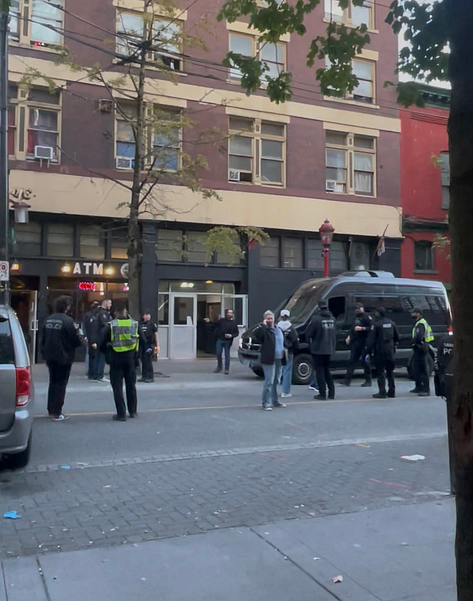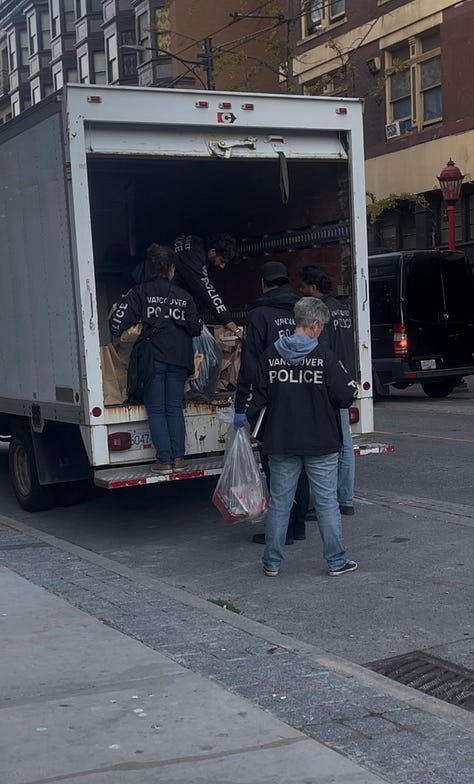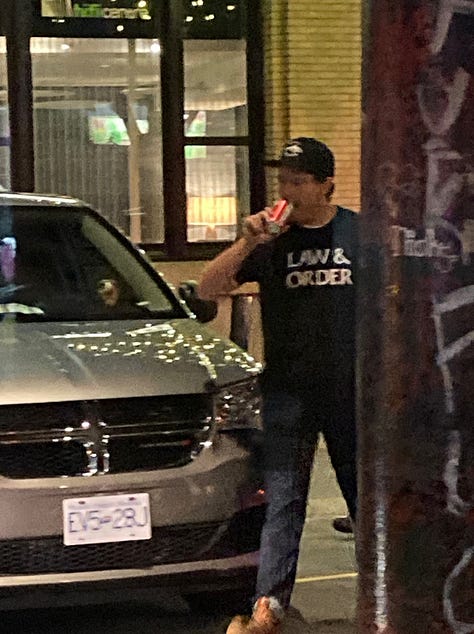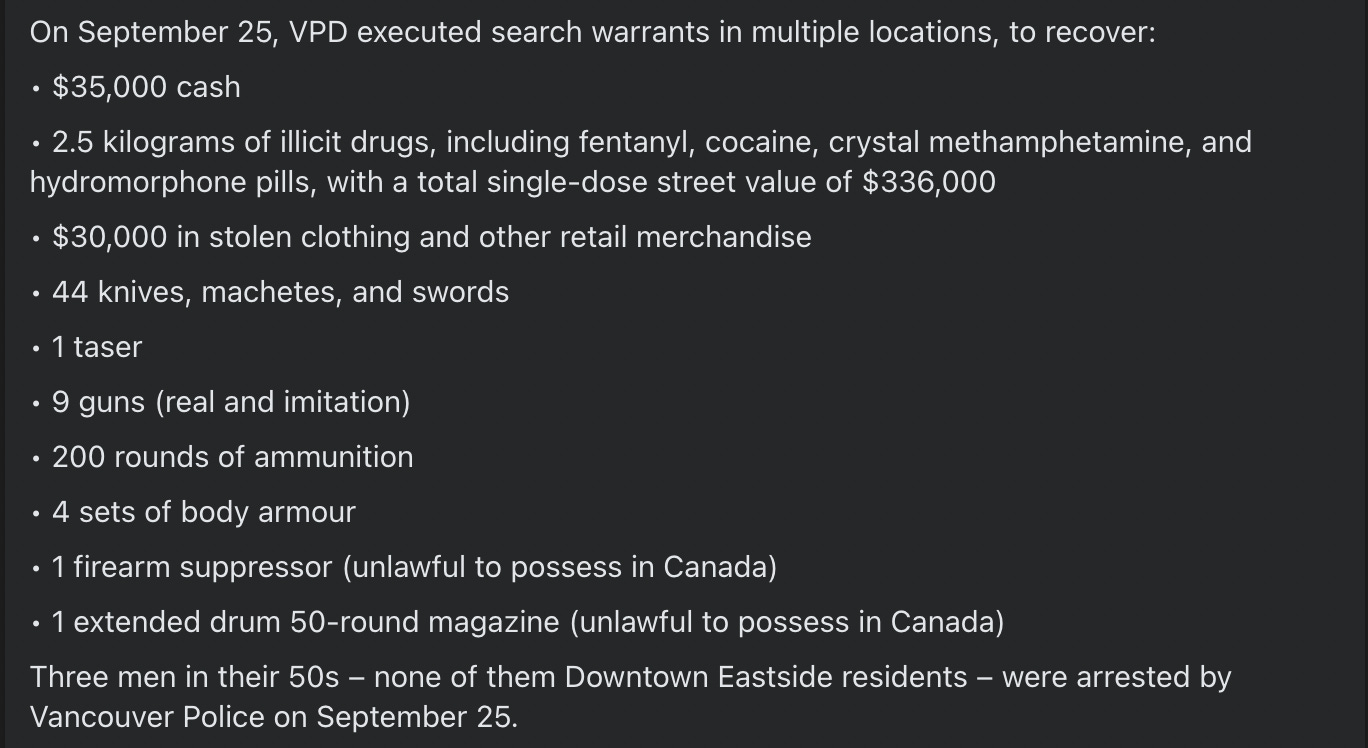P.O.W.E.R. DISPATCH #7
Update on community-based reporting at P.O.W.E.R.
Click for previous bi-monthly dispatches
Dispatch #7 Themes
DTES overdoses increase after neighbourhood police raids
On Sept. 25, the Vancouver Police Department conducted a number of raids at low-income single room occupancy (“SRO”) hotels in the downtown eastside, which reportedly took six weeks of preparation.


Vancouver Police Department raid the West SRO building. Sept. 25, 2025. Photos submitted to P.O.W.E.R.. When VPD conducted these raids and disrupted the unregulated drug supply, the public health system did not initiate urgent access to alternatives for people who rely on the supply that was taken—indeed, the province has never done this—despite the fact that British Columbia is in the ninth year of a formal public health emergency due to the toxic drug supply.
Vancouver Coastal Health did release toxic drug alerts on Sept. 26, Oct. 17, Oct. 22, and October 31 to notify us about increased overdoses. On Oct. 22, two P.O.W.E.R. members on shift helped respond to at least four overdoses on Hastings St. during the two-hour drop-in period.
The VPD not only took credit for this supply-side disruption, but—as shown in the image below—seemed to try to inflate the size of these seizures by calculating the combined value as if the supply had been divided up into 1/10 gram increments, and then sold for more than the street value. (While we’re counting: they also combined fake and real guns into one category.)
Screenshot of excerpt from VPD’s post about the September 25 raids they conducted in SRO hotels. Facebook. In the the Vancouver Sun, reporter Sarah Grochowski uncritically repeated this cost analysis, and employed further exaggerated language by labelling the entire seizure as ‘toxic drugs.’
Park rangers escalate cycle of displacement at Oppenheimer Park
Park rangers continue to escalate against people sleeping in Oppenheimer Park. In the past two weeks, multiple Oppenheimer residents have reported seizures of belongings by Park Rangers to P.O.W.E.R., along with instructions to reduce personal property to fewer than the ‘one bin’ previously permitted, as well as receiving threats of impoundment fines.
Newsletter highlights
In October, P.O.W.E.R. brought attention to the destruction of people’s residences in the Moccasin Flats encampment in Prince George.
P.O.W.E.R. in the news
The Tyee: The Supreme Court of Canada wants you to call 911 if someone is overdosing
CBC News: ‘Historical change’: Vancouver police to create new policing district in DTES
Community activity
While a coalition of nonprofit landlords, including the CEOs of Pacifica Housing and PHS, campaign against tenancy rights by removing so-called ‘supportive housing’ from the Residential Tenancy Act completely—members of P.O.W.E.R. have conducted outreach to hear community concerns, and provided rights-based education to tenants.
P.O.W.E.R. joined 10 other housing justice groups to demand a halt to the stripping of RTA rights from tenants in supportive housing: read the full statement here
This nonprofit landlord campaign follows two substantial 2024 carve outs of RTA rights from supportive housing after the province won a legal case against a tenant who was excluded from the RTA—the win came with a disclaimer from the court that the province must clarify tenancy rights within supportive housing units. BC Housing Minister Ravi Kahlon then signed a ministerial order legalizing guest bans and unsolicited landlord entry (in the name of ‘wellness checks’) in supportive housing buildings; an order which remains relatively untested in tenancy-landlord disputes or in the courts.
Some relevant analysis on ‘supportive housing’ in Vancouver:
CLAS: BC Proposal to Strip Tenant Rights in Supportive Housing is a Betrayal to Renters
Harm Reduction Journal: Increases in housing rules and surveillance during COVID-19: impacts on overdose and overdose response in Vancouver
Our Homes Can’t Wait: “It’s Like Jail” Housing, Homelessness and Carcerality in Vancouver’s Downtown Eastside
University of Victoria: The language of neglect: A critical discourse analysis of single room occupancy housing inspection reports
International Journal of Drug Policy: A qualitative study of the socio-legal contexts of residential evictions in the Downtown Eastside
P.O.W.E.R. also facilitated three peer-to-peer sharing circles for those impacted by police violence during September and October. All three of these groups were at full capacity.
In early November, three P.O.W.E.R. members participated in a community event in Cowichan to discuss resisting police power and displacement. Our friends at North Cowichan Copwatch are highlighting increased forms of displacement and the dehumanization of unhoused people in the region.

